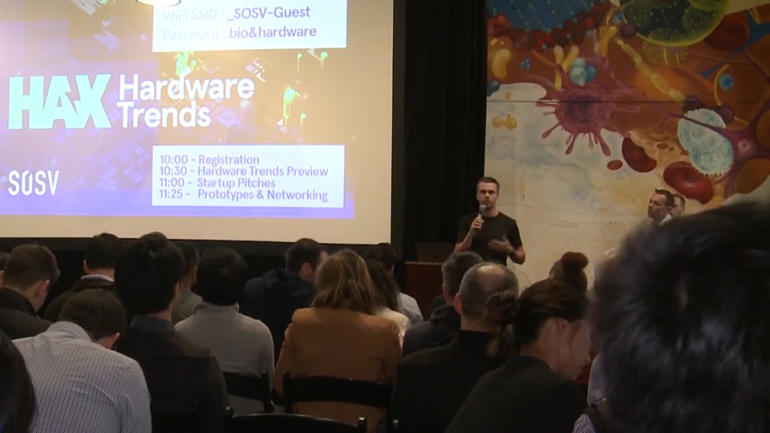Many U-S technology companies are finding themselves caught in the crosshairs of the trade wraith China, being forced to pay higher prices for components.
But that hasn’t stopped U-S startups from forging ties with China’s supply chain.
Mark Niu has the details on the HAX Accelerator and its new batch of startups.
In San Francisco, it’s demo day– a time when investors gather to listen to pitches from startups eager to impress.
The entrepreneurs are part of HAX, a hardware accelerator that affords them the opportunity to spend months in Shenzhen, China, to access a supply chain that can make their product a reality.
“They understand the entire process for U.S. products, so it was just amazing to be in Shenzhen and build this product at super lightning speed,” said Radhika Patil, Co-founder & CEO at Cradlewise.
Hitting the market next year, Cradlewise is a crib that uses artificial intelligence to learn what type of movement and music helps a baby sleep best.
“We have the stored patterns of the baby, how they wake up, different movements, activities. From that we can come to know if the baby is waking up and then we start rocking along with music,” said Patil.
At HAX, startups are taking drone technology to a new level.
Skygauge is one of the only drones in the world where the rotors actually move and compensate.
When you actually hit it, it adapts to your force.
Using one to inspect imposing structures is safer, since it keeps workers on the ground while it takes readings in the sky.
Other startups have gained valuable insight and inspiration from trends booming in China – like micro retail.
“Several times we walked around and just looking at all the different types of vending machines, the interfaces and how people are using them,” said Nishant Jain, Co-founder & CEO at Presso.
The result of that work in both China and the US is Presso, a kiosk that can dry clean a clothing item in five minutes – something that could be especially attractive to hotels.
Co-founder Nishant Jain says despite trade tensions between China and the U.S., business is moving ahead.
“On the current stage it’s not impacting us as much. Definitely a concern for us as we grow our manufacturing,” said Jain. “Whether it’s going to be in China or somewhere else, it’s still up in the air as these things progress. Maybe if things clear up. Obviously it’s easier for us to be in China.”
“Innovation now is a global phenomenon,” said Cyril Ebersweiler, Founder & Managing Director of HAX. ”You can see it from a number of companies that are getting funded worldwide as well as the billion dollar companies that are being birthed every year. It used to be very Silicon Valley-centric, and then became European-centric, and then more Asian-centric as well. So now you have a really good balance.”
Global balance can be found in the startup Mechasys, which is headquartered in Montreal, fine-tuned its strategy at HAX in San Francisco and leveraged Shenzhen’s supply chain to build a laser projector for construction sites.
“We’ve been able to prototype really, really fast,” said William St-Pierre, President & CEO of Mechasys. ”Just to give you an example, if we want to design and manufacture printed circuit boards in Canada where I am from, it would take about five to six open days to manufacture and receive with shipping. In China, Shenzhen, we can do up to six iterations every day. This is like going very, very fast.”
Mechasys can overlay blueprints directly on site, eliminating messy markings and the inaccuracy of tape measures.
It’s yet one more product in a roomful of innovation taking advantage of global knowledge to disrupt business as usual.
 CGTN America
CGTN America

